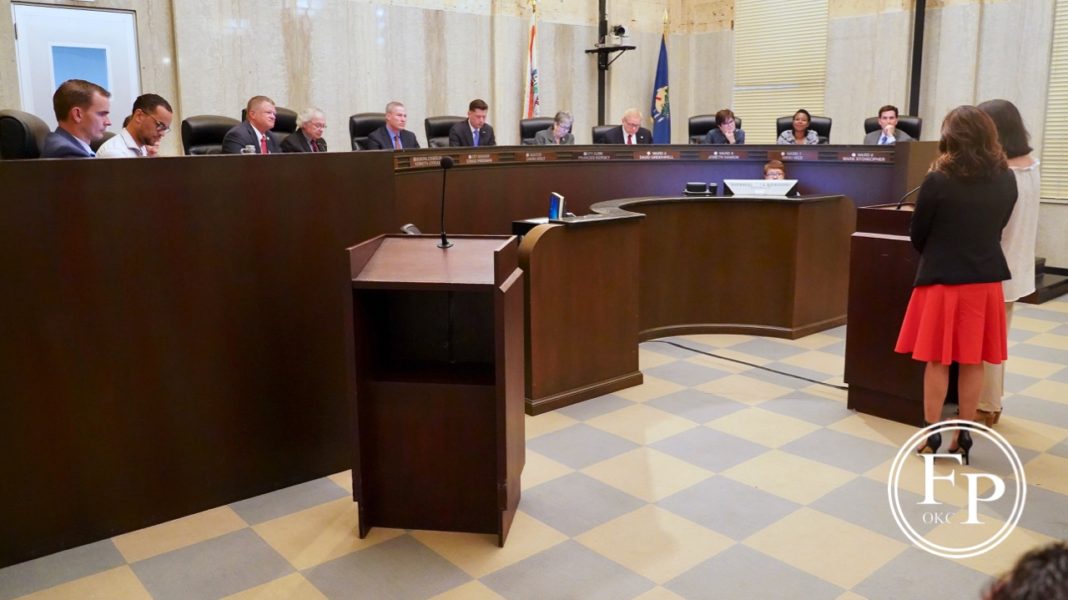Last Updated on December 3, 2019, 7:50 PM | Published: December 3, 2019
At a mercifully short meeting of the Oklahoma City Council, the police explained their new drone policies, and several people expressed concerns about zoning and gentrification.
Police Drones
An item appeared on the consent docket for the purchase of a “small unmanned aircraft” system with cameras and accessories for the Oklahoma City Police Department.
How the sausage gets made
Local government according to columnist Marty Peercy
The item was set aside at the request of Ward 6 Councilwoman JoBeth Hamon* who asked Chief of Police Wade Gourley how the drones would be used by the department.
Gourley explained that the main uses would be to map crime scenes and traffic accidents, with a future use for better surveillance at large public gatherings.
Ward 7 Councilwoman Nikki Nice asked how the department would ensure that the equipment would only be used for the stated purposes. Gourley said that the department will be required to file operating procedures with the FAA. “If we violate the 4th Amendment we’re accountable, just like anybody else,” Gourley said.
The drones and accessories will cost an estimated $75,000. Related items and services will cost an estimated $25,000.
Police Donation
Gourley addressed the Council about a donation of $19,500 from the Kirkpatrick Family Fund. The money will be used to send two upper-level members of the department to a three-week executive development program in Boston.
Hamon and Nice asked questions about the application and selection process for department employees to attend trainings like this.
The Chief said that ultimately he chooses the applicants based on several criteria including the amount of time officers have spent at their rank.
Hamon and Nice asked the Chief about the demographics of people chosen to attend the training events. Gourley was not prepared to be specific about that but said that he would be able to supply them with that information.
Northeast Renaissance
A presentation was given by Cathy O’Connor, President and CEO of the Alliance for Economic Development, about amending the Northeast Renaissance Redevelopment plan. The TIF area’s increment boundaries are proposed to be revised and expanded.
One resident of the area, Michael Washington, is unhappy about the plan. He called it an “absurdity” and said that it was part of a plan to “flagrantly disregard” the independence of the African American community, including the area incorrectly designated as part of the “Innovation District.”
Nice, who represents the area, responded that the area in question is separate from the Innovation District and that she had pushed for this amendment to include infrastructure improvements for the surrounding community.
Homeland Campus
The conversation turned toward the effort to develop the area at N.E. 36th Street and Lincoln Boulevard where the new Homeland store will be built.
In addition to the new grocery store, Homeland will be building a new corporate headquarters adjacent to it. Also, a MAPS 3 Senior Wellness Center will be erected there.
The Council heard from O’Connor again, as well as a project manager. Nice asked what happened to an initial investor who had dropped out of the project and what would happen to ensure that minority investment would be included in the project moving forward. There is currently a minority-owned private equity firm who is investing in the project.
Washington returned to the podium to protest this project saying that improvements along Lincoln were an effort to “gentrify my entire community.”
Healthy Neighborhoods
The City’s Planning Department gave a presentation to explain the details of the proposed Healthy Neighborhoods Overlay for the 73111 zip code in preparation for changing the municipal code to accommodate the overlay.
The area has no grocery stores and does have health outcomes far worse than national averages. It was reported that the life expectancy in the 73111 zip code is more than eight years shorter than average.
The Overlay district will require any small box retail store to offer fresh produce, dairy, and meat. Nice reiterated that the overlay will not be permanent. This ordinance will have its final public hearing on January 7.
*Councilwoman JoBeth Hamon is the wife of this reporter.
Columnist covering local government in Oklahoma City and Oklahoma County from May 2019 through June 2023.










